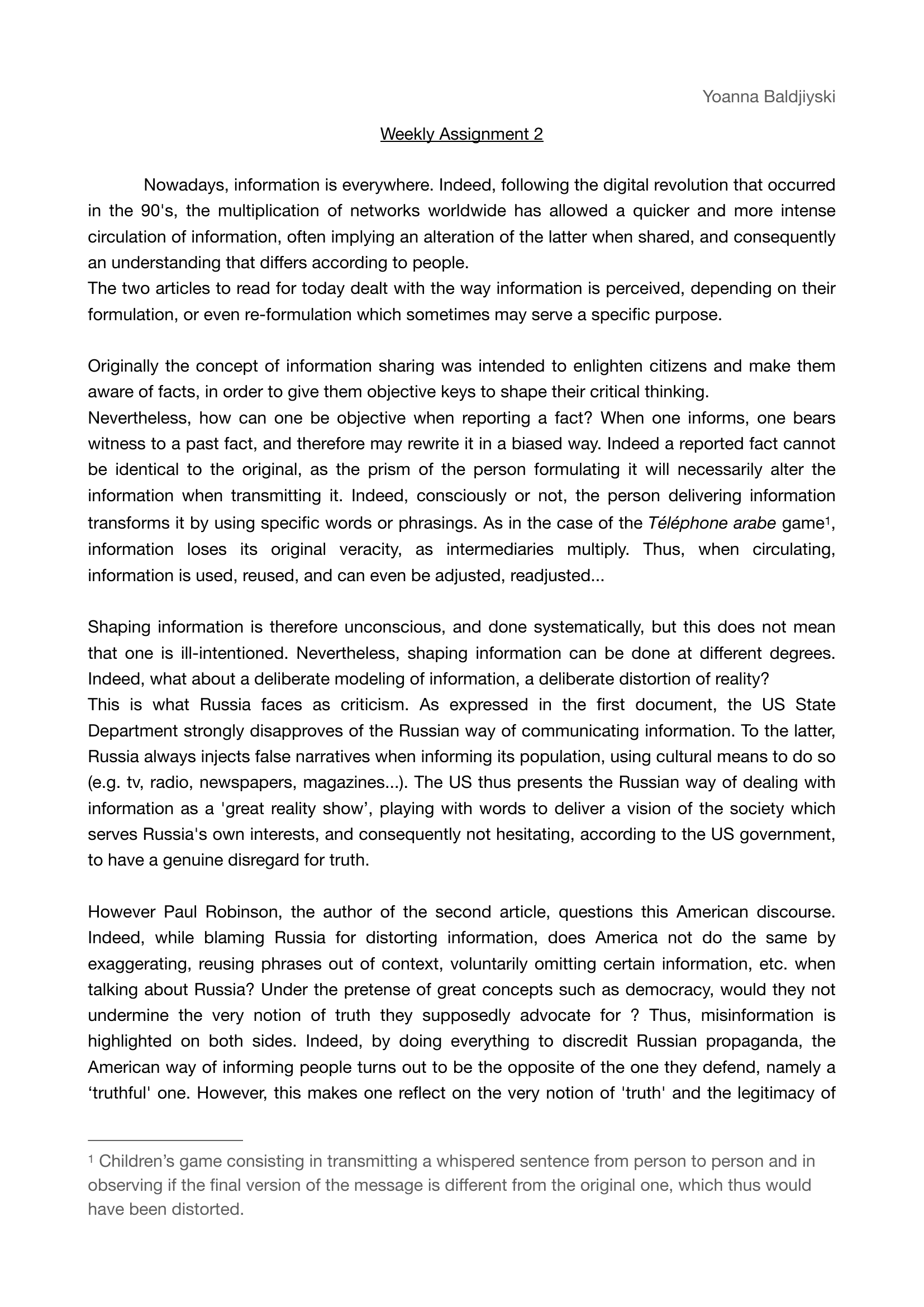Weekly assignment
Publié le 15/02/2022
Extrait du document
«
Yoanna Baldjiyski
Weekly Assignment 2
Nowadays, information is everywhere.
Indeed, following the digital revolution that occurred
in the 90's, the multiplication of networks worldwide has allowed a quicker and more intense
circulation of information, often implying an alteration of the latter when shared, and consequently
an understanding that di ers according to people.
The two articles to read for today dealt with the way information is perceived, depending on their
formulation, or even re-formulation which sometimes may serve a speci c purpose.
Originally the concept of information sharing was intended to enlighten citizens and make them
aware of facts, in order to give them objective keys to shape their critical thinking.
Nevertheless, how can one be objective when reporting a fact? When one informs, one bears
witness to a past fact, and therefore may rewrite it in a biased way.
Indeed a reported fact cannot
be identical to the original, as the prism of the person formulating it will necessarily alter the
information when transmitting it.
Indeed, consciously or not, the person delivering information
transforms it by using speci c words or phrasings.
As in the case of the Téléphone arabe game1,
information loses its original veracity, as intermediaries multiply.
Thus, when circulating,
information is used, reused, and can even be adjusted, readjusted...
Shaping information is therefore unconscious, and done systematically, but this does not mean
that one is ill-intentioned.
Nevertheless, shaping information can be done at di erent degrees.
Indeed, what about a deliberate modeling of information, a deliberate distortion of reality?
This is what Russia faces as criticism.
As expressed in the
rst document, the US State
Department strongly disapproves of the Russian way of communicating information.
To the latter,
Russia always injects false narratives when informing its population, using cultural means to do so
(e.g.
tv, radio, newspapers, magazines...).
The US thus presents the Russian way of dealing with
information as a 'great reality show’, playing with words to deliver a vision of the society which
serves Russia's own interests, and consequently not hesitating, according to the US government,
to have a genuine disregard for truth.
However Paul Robinson, the author of the second article, questions this American discourse.
Indeed, while blaming Russia for distorting information, does America not do the same by
exaggerating, reusing phrases out of context, voluntarily omitting certain information, etc.
when
talking about Russia? Under the pretense of great concepts such as democracy, would they not
undermine the very notion of truth they supposedly advocate for ? Thus, misinformation is
highlighted on both sides.
Indeed, by doing everything to discredit Russian propaganda, the
American way of informing people turns out to be the opposite of the one they defend, namely a
‘truthful' one.
However, this makes one re ect on the very notion of 'truth' and the legitimacy of
Children’s game consisting in transmitting a whispered sentence from person to person and in
observing if the nal version of the message is di erent from the original one, which thus would
have been distorted.
ff
fi
fi
ff
fl
fi
ff
fi
1.
»
↓↓↓ APERÇU DU DOCUMENT ↓↓↓


